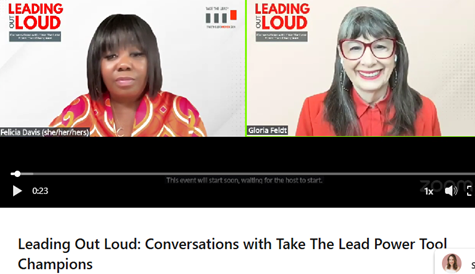You Bet Liberal Feminists Ruined the Workplace—Let’s Keep Up the Good Work
Issue 2866— November 10, 2025
Whenever a tired columnist runs out of ideas, you can almost set your watch by it: a click-bait essay will soon appear blaming feminists or “uppity women” for whatever’s bothering them that week.
Voila! Out pops the non-topic of feminism’s death—or feminism as the ruination of civilization—to give them some quick clicks.
Feminism’s death has been announced many times. The classic June 29, 1998 Time magazine cover story, “Is Feminism Dead?”, kicked off the implication that the feminist movement had done its job and was now either irrelevant or over. It became a cultural signal repeated endlessly since.
LiisBeth asked ironically, “Is Feminism Dead—Again?”, published June 20, 2022—just four days before the U.S. Supreme Court overturned Roe v. Wade and trashed 50 years of women’s reproductive self-determination. The author played off Michele Goldberg’s gloomy declaration that feminism had, proverbially, not died with a bang but a whimper.
I could go on, but you get the point.
What these commentators rarely notice is the sheer illogic of declaring a movement “dead” at the same time it’s accused of being so powerful it has taken over everything—sometimes in the same paragraph. The recent New York Times column that caused such a flap on social media—“Is Liberal Feminism Ruining the Workplace?”—is a perfect example.
Before I say anything else about this egregious interview with two anti-feminist women, the answer to that question is a resounding, “NO.”
The piece, led and edited by the Times’ designated conservative columnist Ross Douthat, offers little pushback to his interviewees’ stunning illogic and pseudo-scholarship as they try to make “feminine versus masculine vice” an actual thing and “conservative feminism” something other than an alternative-reality co-optation of real feminism’s egalitarian principles.
It’s usually a man who smugly writes this drivel—but not always. After all, I’m proud (yes, proud) to have been listed 10 times in commentator Kate O’Beirne’s book Women Who Make the World Worse (subtitled, of course, …and How Their Radical Feminist Assault Is Ruining Our Schools, Families, Military, and Sports), blurbed by none other than Laura Ingraham. My 10 mentions beat Jane Fonda (4) and Betty Friedan (9), and put me just behind Gloria Steinem (14).
Douthat’s “Interesting Times” column that drew so much blowback was an interview with two conservative female writers sharing the same conclusion from slightly different angles. Helen Andrews, known for her “feminism is all-powerful” trope in The Great Feminization, and Leah Libresco Sargeant, author of The Dignity of Dependence (a title that says it all), both agree that feminism is the root of society’s ills. They toss around “woke” as an epithet—a code word for “evil feminism.”
(As Jane Fonda said: “Woke just means you give a damn about other people.”)
Let’s zoom out. This debate isn’t about women’s virtues or vices—it’s about money, sex, and power. Those are the sinew and soul of human existence, and women’s relationships with all three are changing so rapidly that many men and women feel a sense of chaos—perhaps even fear—about what’s happening around them, within them, and sometimes because of them.
Money and sex are symbolic of two essential precursors to power of any kind: the human right to own and control one’s body, and the economic right to earn one’s independence. When a person has both—economic and reproductive self-determination—they hold the greatest power of all: the power of choice, the power to chart the course of their own life.
I hope my life’s work to advance gender and racial equality earns me a proud place on any “worst” list compiled by a privileged woman fearful of losing her dominance. She hasn’t yet learned that the pie of generative power TO—as opposed to the old oppressive power over—is infinite.
People like Douthat and his interviewees genuinely fear that women are changing the world—because we are.
Thank goodness for women like Frances Perkins, the first female Secretary of Labor, without whom we wouldn’t have Social Security, the 40-hour workweek, child-labor laws, or a minimum wage. Perkins was galvanized by the fiery deaths of the Triangle Shirtwaist Factory’s women workers who had none of those protections.
As a woman in the 1970s, I couldn’t get a car loan or credit card without my husband’s signature, despite earning as much or more than he did. The vestiges of coverture—laws that made married women legally nonexistent—were still alive and well. And that, apparently, is what some people would like to resurrect.
It’s easy to forget—or for younger generations never to know—how bad things were “before.”
That’s why “Know Your History” is the first of my 9 Leadership Power Tools from No Excuses: 9 Ways Women Can Change How We Think About Power, and the foundation of Take The Lead’s curriculum proven to accelerate women’s leadership journeys.
To be sure, there’s still plenty of work left if we’re truly going to “ruin” the workplace completely.
Reshma Saujani, founder of Moms First, which tackles the unfinished business of caregiving and human-centered workplace policies, offered a scathing rebuttal—be sure to watch the video clip.
Reshma Saujani, (L) Moms First Founder.
And it’s not just about us women. We’ve made the workplace more prosperous for everyone. The smart men already know this.
Almost every major consulting firm—from McKinsey to Bain to MSCI—finds that companies with more women in leadership are more profitable. The metrics vary (for example, a 9% higher profitability for companies in the top quartile for gender and racial diversity—dare we say, woke?), but they all reach the same conclusion.
As The Woman Times headline put it perfectly: “Women Didn’t Ruin the Workplace. They Ruined Misogyny and Mediocrity.”
You bet women have changed the workplace—and made it better for everyone.
Did you miss the Leading Out Loud LinkedIn Live?
Watch or rewatch Felicia Davis and me talk about our amazing Power Tool Champions.
Watch here.
GLORIA FELDT is the Co-founder and President of Take The Lead, a motivational speaker, and a global expert in women’s leadership development and DEI for individuals and companies that want to build gender balance. She is a bestselling author of five books, most recently Intentioning: Sex, Power, Pandemics, and How Women Will Take The Lead for (Everyone’s) Good. Honored as Forbes 50 Over 50, and Former President of Planned Parenthood Federation of America, she is a frequent media commentator. Learn more at www.gloriafeldt.com and www.taketheleadwomen.com. Find her @GloriaFeldt on all social media.



